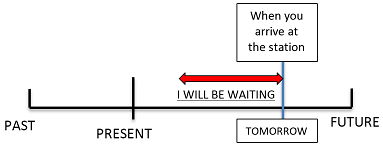Futur continu
(Future continuous)
Introduction
On utilise le futur continu (aussi appelé futur progressif) pour décrire une action qui commencera et continuera dans le futur.- When you arrive at the station tomorrow, I will be waiting at the entrance.
will be waiting = the action starts tomorrow before you arrive and continues (until you arrive).

Formation
Pour former le futur continu, on utilise "will be"+ la forme en "-ing" du verbe principal.
| Positif |
I / You / We / They
He / She / It |
will be
'll be |
waiting | at the entrance. | |
| Négatif |
will not be
won't be |
||||
| Forme interrogative | Will |
I / You / We / They
He / She / It |
be | at the entrance? | |
Exemples
- Affirmatif:
I can't meet you next week because I will be studying.
"Studying" est une action continue qui se déroulera la semaine prochaine.
- Forme négative
I won't be playing tennis this afternoon because I have a headache.
"Playing" est une action continue qui ne se déroulera pas cet après-midi.
- Forme interrogative:
Will you be going to the cinema this weekend?
"Going to the cinema" est une action continue qui se déroulera peut-être ce week-end.
Exercices d'entraînement
Complétez les phrases en mettant le verbe entre parenthèses à la forme affirmative, négative ou interrogative du futur continu:
.E xercices d'entraînement supplémentaires
Complétez les phrases avec le passé continu:.
Create a free Getting Started account
Liens associés
Les exercices suivants comportent l'utilisation de cette structure grammaticale :
Vous pourriez également être intéressé par:
- Exercices de vocabulaire d'anglais des affaires
- Écoute Compte Pro
- Lecture Compte Pro
- Scenario-based dictation exercises – business English Compte Pro
- Scenario-based dictation exercises – general English
Vous pourriez également être intéressé par:
Débutant
- Passé simple
- Passé continu
- Présent simple
- Présent continu (présent)
- Present perfect
- 'Going to' et 'will'
- Présent continu (futur)
- Impératifs
- To be (être)
- Pronoms: sujet, objet
- Pronoms relatifs
- Adjectifs et pronoms possessifs
- Adjectifs et pronoms démonstratifs
- Ordre des adjectifs
- Questions en WH (pronoms interrogatifs)
- Articles: 'a', 'an', 'the'
- Prépositions de temps et de lieu
- 'There is' / 'there are' et quantificateurs
- Conjonctions 'and', 'or', 'but'
- Comparatifs / superlatifs ('than')
- Conditionnel zéro ('if')
- Premier conditionnel ('if')
- Modaux: 'can' / 'can’t', 'could', 'will', 'shall'
- Conjugaison
- Adverbes de séquence
Intermédiaire
- Plus-que-parfait
- Passé simple contre present prefect
- Passé simple contre passé continu
- Present perfect continu
- Futur simple
- Futur continu
- Passif
- Discours indirect
- 'Used to' / 'would'
- Second conditionnel
- Troisième conditionnel
- Propositions relatives
- Pronoms réfléchis
- Modaux: 'must', 'have to', 'should', 'should have'
- Conjugaison: gérondif ou infinitif
- Adverbes de quantité
- Ordre des adjectifs
- Adjectifs: -ed ou -ing
Grammaire
Identifiez rapidement et concentrez-vous sur les problèmes de grammaire :
- Fiches d’exercices et de tests de grammaire
- Scenario-based grammar exercises
- Grammar additional practice questions
- Pratique de la conjugaison des verbes
- Pratique des formes conditionnelles
Améliorez votre grammaire
Vocabulaire
Vocabulary exercises:Développez votre vocabulaire en utilisant nos trois modules d'entraînements:
- Entraînement de vocabulaire anglais général
- Entraînement de vocabulaire en anglais des affaires
- Entraînement d’expressions
Apprendre le vocabulaire
Exercices de dictée
Pratiquez vos capacités d’écoute et votre orthographe en utilisant nos exercices de dictées:
- Scenario-based dictation exercises - general English
- Scenario-based dictation exercises - business English
- Dictée : Point de grammaire
- Nombres
Faire des exercices de dictée
Lessons en vidéo
Concentrez-vous sur des domaines spécifiques de l'anglais des affaires en utilisant nos lessons en vidéo :
Suivre une leçon vidéo





